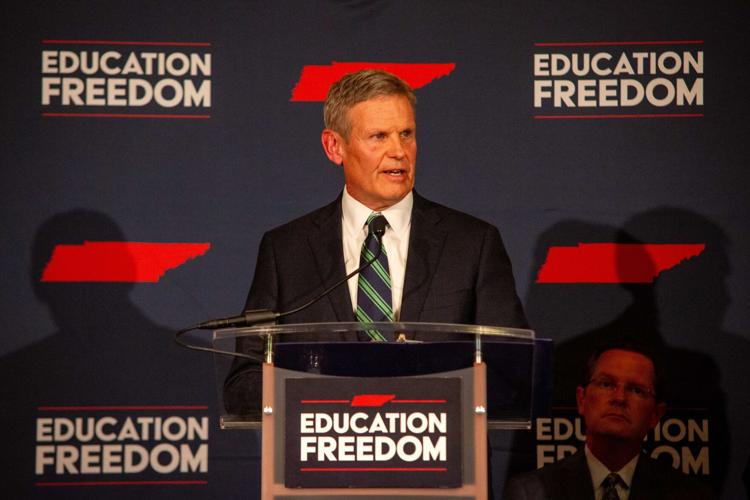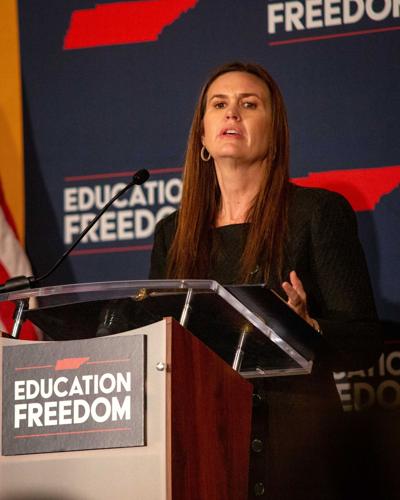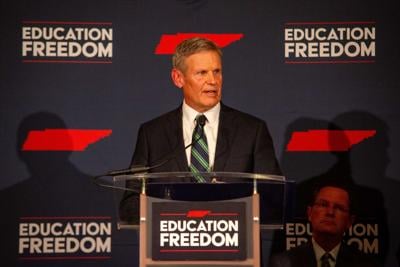Gov. Bill Lee is ready to expand Tennessee’s school voucher program statewide, introducing the Education Freedom Scholarship Act at a packed press conference Tuesday afternoon. He was joined by several members of the Tennessee General Assembly, as well as Arkansas Gov. Sarah Huckabee Sanders, who successfully shepherded a similar program in her state. Sanders touted the universal voucher push as “an absolute conservative education revolution.”
Tennessee currently provides vouchers to qualifying families through education savings accounts, though those are available only to students in Davidson, Shelby and Hamilton counties, as well as those zoned for the state-run Achievement School District. Currently, qualifying students must fall below a certain income threshold. The current ESA program, which was narrowly passed by the state legislature in 2019, was quickly met with litigation for targeting Davidson and Shelby counties. Several judges agreed with this argument, and the program was held up in court until 2022.

Arkansas Gov. Sarah Huckabee Sanders
Gov. Lee’s newly proposed legislation would expand both the scope and eligibility requirements of the program to include students across the state. As introduced, it would provide 20,000 vouchers to students as soon as the 2024-25 school year. Half of those would be reserved for students who are already enrolled in the ESA program, have a disability or are at or below 300 percent of the federal poverty level. The other half would be available to all other students, though priority would go to the former group if applications exceed available scholarships. The legislation seeks to expand the program further by the 2025-26 school year.
Before the announcement was officially made, news of the plan garnered significant criticism from urban and rural Tennesseans alike. Although vouchers are already available to students in Nashville, local politicians have vehemently condemned an expansion of vouchers on social media. Columbia Mayor Chaz Molder has referred to the legislation as a “mistake.”
“It will do more harm to the greater good than the select few who may benefit, and it’s a slap in the face to our teachers,” Molder tells the Scene. “This is almost as absurd as refusing federal funding for education. I am convinced that the large majority of Tennesseans who oppose this privatization of public education will let their state legislative delegation know; and I am hopeful the legislature will listen to a large majority of their districts and oppose such a plan.”
A handful of people representing the local chapter of Americans United for Separation of Church and State held signs protesting the legislation during Tuesday’s press conference.
Looking at the politics and the impact of school choice in Tennessee
“We are against vouchers,” said Mirabelle Stoedter, who serves as vice president of the group’s local chapter. “Public schools should come first. The money should be used to make the public schools better. Yeah, there's problems with the public schools — but we need the money to make them better.”
Proponents of vouchers say they provide more educational opportunities for families and give parents more agency in their students’ education. Critics say they divert funds from public schools and allow tax dollars to subsidize education in religious institutions. Additionally, private schools don’t have to follow federal requirements, such as providing students with disabilities an individualized education plan, and they aren’t required to admit every student who comes to them, unlike public schools.
“We applaud Gov. Lee for his strong support of educational choice for all families across the Volunteer State,” says Walter Blanks Jr., a spokesperson for American Federation for Children’s Tennessee chapter. “Legislatures across the country have passed universal choice programs and have seen great demand and widespread parent satisfaction follow. Gov. Lee understands that parents know their child best, and all parents should be able to access the best K-12 education for their family’s unique needs.”
In late 2019, after the scaled-back plan was passed, Lee told the Nashville Post he had no plans to seek to expand it to other counties.
"I don't have any plans for that," he said at the time. "I think rural schools don't have the opportunity that an urban center does for that kind of change. I have no plans to expand that beyond the counties where it exists now, unless the people in those counties wanted that change."








